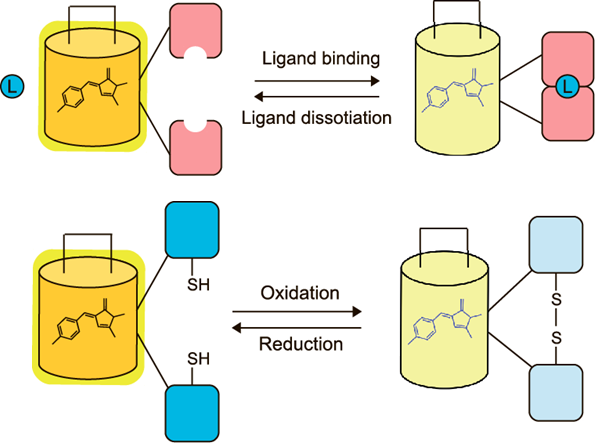Group of metabolic bases of pathology
The group was established in 2018.
The team of the group is engaged in the development of genetically encoded biosensors for imaging the dynamics of various biological processes in living systems in real time. Tools of this kind have gained wide popularity for solving various problems in biology and medicine. Such a biosensor is a protein molecule, which, as a rule, consists of two functional parts: sensory and fluorescent. Fluorescent proteins are used as a fluorescent domain. As the sensory part of the biosensor, natural domains of proteins that perform various functions in cells are most often used. The principle of operation of such a biosensor is based on the fact that under the influence of a specific stimulus, for example, with specific binding of a ligand, the sensory domain undergoes conformational changes that are transmitted to the fluorescent protein as part of the construct, which causes changes in spectral characteristics. Thus, the dynamics of changes in the fluorescent signal in a system reflects the dynamics of changes in the studied biological parameter.

This approach to the visualization of biological processes is becoming an integral part of modern research. Such methods are universal and applicable for use in a wide variety of biological objects. Using fluorescent biosensors, the scientific group is engaged in the in vivo study of physiological and pathological processes.
Currently, the group is working on in vivo studies of the dynamics of intracellular processes in brain tissue during the development of ischemic stroke in rodents. Another model object of the group is zebrafish D. rerio. Using this object, the group is engaged in the study of inflammatory processes caused by various factors.
- development of biosensors for registration of hypohalous acids and their derivatives;
- development of biosensors for studying the metabolism of fatty acids;
- development of biosensors for registration of hydrogen sulfide H2S;
- study of the key parameters of brain cells in the early stages of the development of ischemic stroke;
- study of redox processes in tissues in inflammatory reactions.
| Fullname | Position | Contacts |
|---|---|---|
| Dmitry Bilan, D.Sc | l. r. f. | |
| Viktoriya Chebanenko | j. r. f. | |
| Ivanenko A.V. | j. r. f. | |
| Veronika Katrukha | j. r. f. | |
| Kokova (Demidovich) A.D. | j. r. f. | |
| Alexander Kostyuk, Ph.D. | j. r. f. | |
| Sergeeva A.D. | j. r. f. | |
| Sudoplatov M.A. | t. q. - lab. as. | |
| Sof'ya Suhinina | t. q. - lab. as. | |
| Tyat'kov M.G. | t. q. - lab. as. | |
| Vasil'ev A.V. | t. q. - lab. as. | |
| Krestina Vasil'eva | t. q. - lab. as. | |
| Hlistova M.A. | j. r. f. | |
| Hramova Y.V. | s. r. f. | |
| Naumov L.L. | res. eng. |
 Loading...
Loading...Scientific projects
 Loading...
Loading...Dmitry Bilan
Russia, Moscow, Ul. Miklukho-Maklaya 16/10 — On the map
